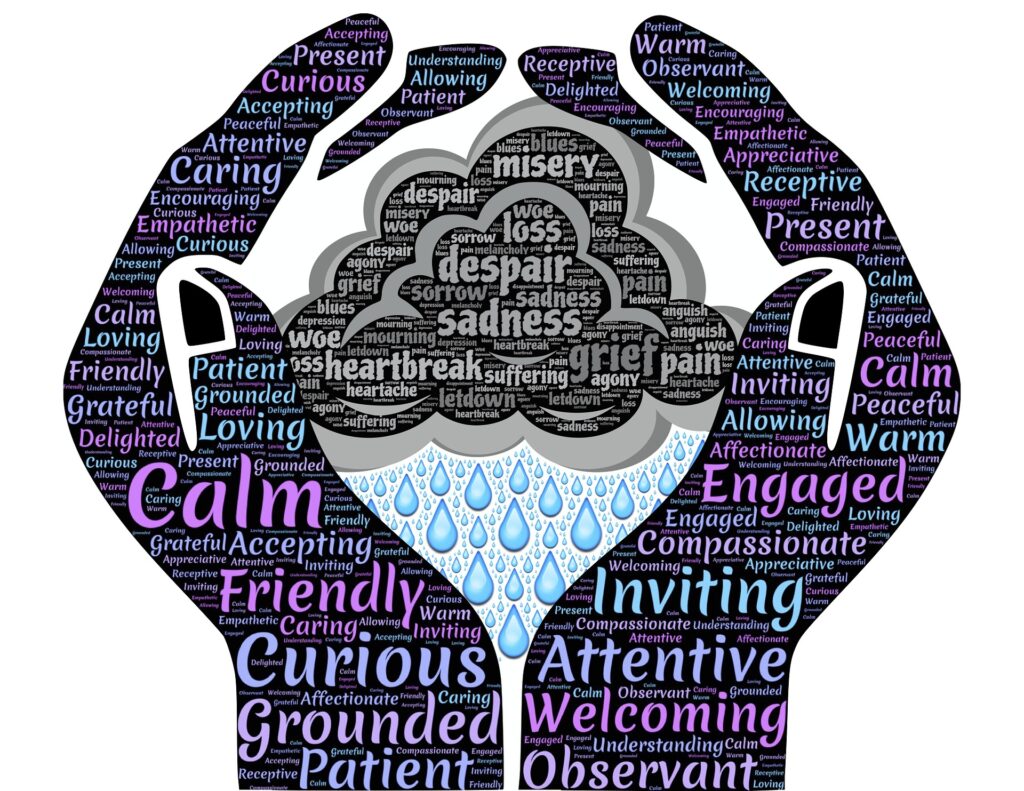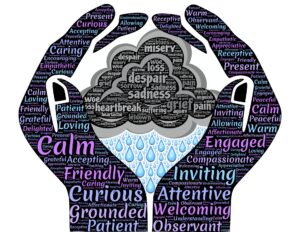Guest blog by Codie Surratt, MA, LPC, LMT
The resolutions season is well underway. You know, the season that often begins with the phrase “New Year, New Me.” In Internal Family Systems, we recognize that an inner critic is often running the show at this time of year and that its voice can get extremely loud and disapproving. So it might be good to pause the harshness for a moment and learn more about Internal Family Systems and self-compassion.
IFS, or Internal Family Systems, is an evidence-based theoretic approach created and adapted by psychologist Richard (Dick) Schwartz. This approach essentially states that when you are burdened and unable to cope with challenges, you develop subpersonalities (or parts) that help you navigate those challenges. At their core, these parts are protective in nature, even if they can be more harmful than helpful in action. In discussing Internal Family Systems, we’ll also discuss why self-compassion is important.
That’s a bit of a nutshell definition, but suffice it to say we all have parts and sometimes those parts are automatic and feel as if they are running the show.
The 8 C’s
In this approach, Schwartz speaks of your self-energy, which simply means the core self with which you are born. This self-energy is made up of qualities called the 8 C’s.
Those stand for:
- Compassion
- Clarity
- Connection
- Creativity
- Calm
- Courage
- Curiosity
- Confidence
According to the theory, when you are in your Self Energy and your parts are no longer running things, you notice that one or more of the 8 C’s are present and being felt. Think about it – when you start comparing yourself and finding ways to tear yourself apart, can you really say that you are in any way connected, compassionate, or feeling confident? Not really.
Related Reading: Treating Anxiety with Internal Family Systems Therapy
The Inner Critic
And that brings us back to that inner critic part. This time of year with its new beginnings and resolutions can also bring with it sadness, despair, inadequacy, and so on. Feelings you probably would rather not feel. According to Schwarz, into this pain enters a part. And often this part uses some harsh internal language.
According to Schwartz, parts operate as protectors. So if you think of it that way, there are no bad parts. These protective parts may feel awful when running the show, but their motivation is always to protect you from uncomfortable or painful feelings, which are often rooted in trauma. And honestly, sometimes these parts help. That is until they don’t because it inevitably breaks down. And when these parts are the primary way we are surviving our days, they can feel absolutely overwhelming.
Back to that inner critic part. That part is often loudest when you feel at your most vulnerable. Maybe you’ve put on weight, lost a job, suffered a breakup, or simply have less emotional bandwidth to deal with life. This is fertile ground for you to develop parts subconsciously to help you cope with these truly challenging experiences and feelings.
That inner critic loves to swoop in and envelop you in comparisons and harsh language. This includes all the “shoulds” you can conjure: I should be thinner, smarter, faster, better, etc. And while this inner critic is harsh, its benevolent goal is to protect you from something much more painful: not being enough.
Working with your inner critic to help it shift takes time and patience. This voice is probably an automatic response when you don’t feel you are succeeding in life. When you don’t feel you are enough. This is where the benefits of self-compassion come can be realized.
How to navigate your inner critic
Here are some ways to help navigate this very familiar inner critic:
1). Become familiar with your inner critic
Maybe your inner critic shows up as self-comparison at work or maybe when you’re scrolling social media. Or maybe your inner critic shows up when you have a big presentation at work or school. Maybe it’s that old familiar voice from familial relationships that wonders what the neighbors will think? However it shows up, slow down and learn to listen to your inner critic. Become familiar with the harsh language you may use with yourself and the situations that are most triggering for this part. Connect with how you physically feel when this inner critic shows up. You can enlist the body to help you identify your parts, so allowing yourself space to understand the ways you feel when the inner critic part shows up can allow for further connection.
2) Benefits of self-compassion
Having compassion for yourself can be challenging because it’s not always a familiar feeling. When you notice your inner critic part showing up, see what it feels like to turn some compassion inward and counteract the harsh language with something more caring. Again, this can feel quite challenging for many. Be gentle with yourself.
3). From the place of self-compassion, enlist some curiosity.
See what that harsh critic might be fearing. Remember, your parts show up to protect you. Seeing if you can get closer to what this critical voice is protecting you from can be key to beginning the process of unburdening this part and allowing yourself the space to change. For example, you may notice that your inner critic shows up when you’re around family and that it points out all the ways you don’t measure up. Sit with this part of you and ask yourself what you feel underneath the harsh language. What is that part scared of? What might you need at that moment? Whatever it may be, allow yourself the space to truly listen to your own heart, your thoughts, and your emotions. I often advise my clients to keep a journal or notes app to help jot things down. I also use the hindsight method for this with my clients. It’s challenging to start with trying to notice these things in the moment, so take some time after a particularly hard day and reflect back.
4). Begin to embrace a sense of gratitude for that harsh critical part.
This may sound backward, but remember you are working to strengthen your self-compassion muscle. When you notice those harsh words or self-critiques showing up, thank them for continuing to show you where the work needs to be done. Hold a sense of gratitude for the effort this part is putting into your protection. Notice what this feels like to be softer and more gentle with yourself as you navigate a new way of relating to your inner critic.
Internal Family Systems Overview
IFS is a gentle theoretical practice that allows you to slow down without constantly searching for what is wrong with you. It adopts the stance that every one of us has protective coping parts that show up when we are hurting and vulnerable. It helps to begin to love ALL of you, even those things you often try to hide or change.
As always, if you feel you’d like help with this or any other aspects of your mental wellness journey, please reach out to us in our Northern Illinois locations in Glen Ellyn, Chicago (Jefferson Park), Sycamore, or Yorkville.
Codie Surratt uses a variety of evidence-based treatments and techniques: mindfulness-based therapy, cognitive behavioral therapy, positive psychology, strengths-based therapy, and somatic therapy. She also has experience coaching clients to help with short-term goal setting, relationship and job transitions, as well as self-esteem, health, and wellness issues. Codie offers sessions by telehealth or sees clients in-person in the Glen Ellyn office.







